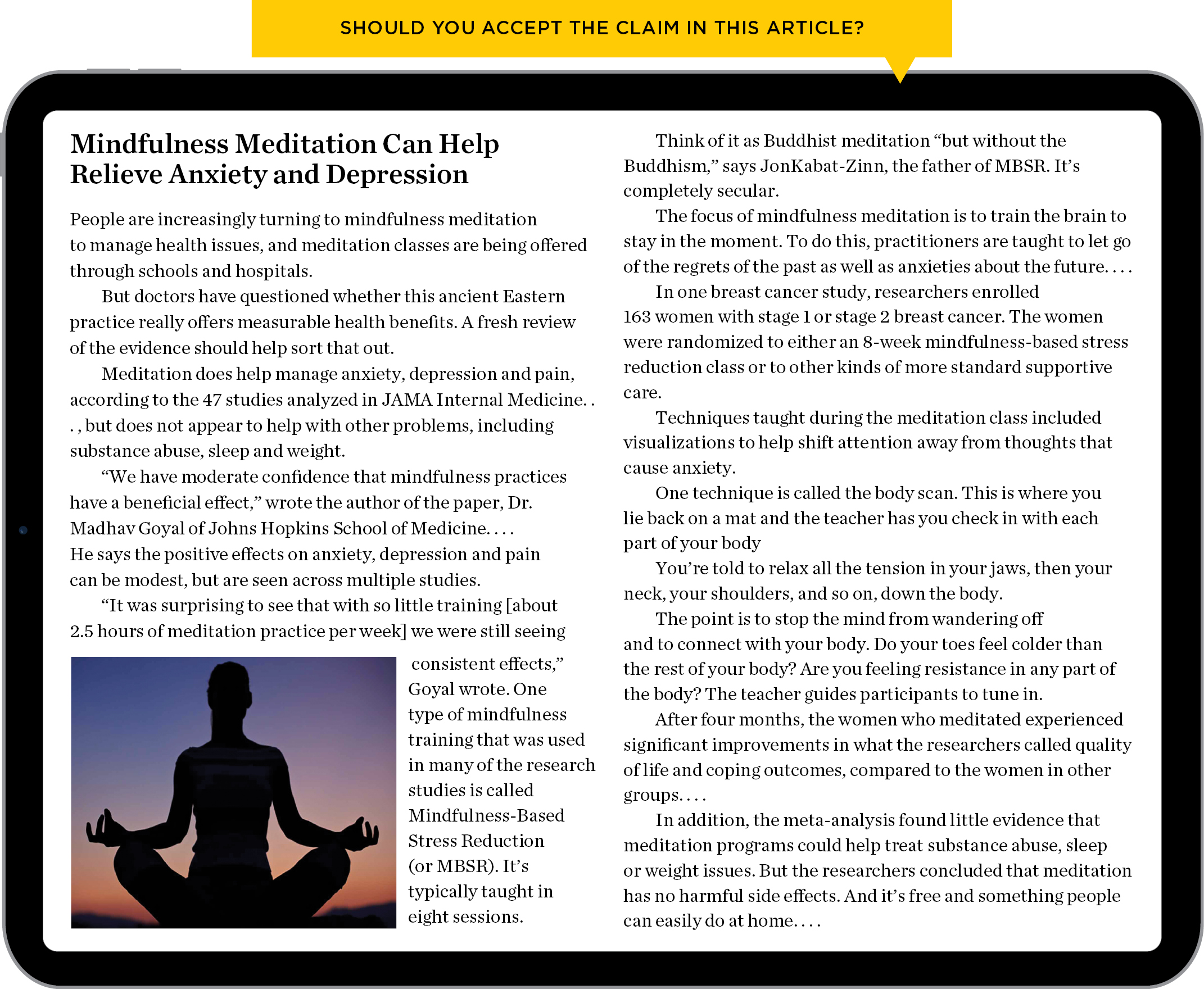EVALUATING PSYCHOLOGY IN THE REAL WORLD
SHOWHIDE
You’re Stressed Out ...
Can Meditation Help?
Like most students, at some point you will feel some stress and worry about school, work, family, friends, or health. Suppose that you want to learn about reducing stress and worry. In searching the internet, you find the following article from the National Public Radio website on how meditation may alter consciousness in ways that can reduce anxiety. As you read this article, think critically about its contents.

More information
The infographic reads, like most students, at some point you will feel some stress and worry about school, work, family, friends, or health. Suppose that you want to learn about reducing stress and worry. In searching the internet, you find the following article from the National Public Radio website on how meditation may alter consciousness in ways that can reduce anxiety. As you read this article, think critically about its contents. Should you accept the claim in this article? Mindfulness Meditation Can Help Relieve Anxiety and Depression. People are increasingly turning to mindfulness meditation to manage health issues, and meditation classes are being offered through schools and hospitals. But doctors have questioned whether this ancient Eastern practice really offers measurable health benefits. A fresh review of the evidence should help sort that out. Meditation does help manage anxiety, depression, and pain, according to the 47 studies analyzed in JAMA Internal Medicine, but does not appear to help with other problems, including substance abuse, sleep, and weight. “We have moderate confidence that mindfulness practices have a beneficial effect,” wrote the author of the paper, Doctor. Madhav Goyal of Johns Hopkins School of Medicine. . . . He says the positive effects on anxiety, depression, and pain can be modest, but are seen across multiple studies. “It was surprising to see that with so little training [about 2.5 hours of meditation practice per week] we were still seeing consistent effects,” Goyal wrote. One type of mindfulness training that was used in many of the research studies is called Mindfulness-Based Stress Reduction (or M B S R). It’s typically taught in eight sessions. Think of it as Buddhist meditation “but without the Buddhism,” says Jon Kabat-Zinn, the father of M B S R. It’s completely secular. The focus of mindfulness meditation is to train the brain to stay in the moment. To do this, practitioners are taught to let go of the regrets of the past as well as anxieties about the future. . . . In one breast cancer study, researchers enrolled 163 women with stage 1 or stage 2 breast cancer. The women were randomized to either an 8-week mindfulness-based stress reduction class or to other kinds of more standard supportive care. Techniques taught during the meditation class included visualizations to help shift attention away from thoughts that cause anxiety. One technique is called the body scan. This is where you lie back on a mat and the teacher has you check in with each part of your body. You’re told to relax all the tension in your jaws, then your neck, your shoulders, and so on, down the body. The point is to stop the mind from wandering off and to connect with your body. Do your toes feel colder than the rest of your body? Are you feeling resistance in any part of the body? The teacher guides participants to tune in. After four months, the women who meditated experienced significant improvements in what the researchers called quality of life and coping outcomes, compared to the women in other groups. . . . In addition, the meta-analysis found little evidence that meditation programs could help treat substance abuse, sleep, or weight issues. But the researchers concluded that meditation has no harmful side effects. And it’s free and something people can easily do at home. . . . Evaluating the claim: ask yourself the following questions: Step 1, Is the source of the claim believable? Step 2 Is there strong evidence for the claim? Step 3 Do other believable sources agree about the claim? If you rejected the claim or found the evidence lacking, why did you do so? If you found that the evidence supports the claim, how might this information change how you think and act? A photo on the left side shows a woman meditating in dark.
Evaluating the Claim
Ask yourself the following questions:
Step 1Is the source of the claim believable?
Step 2Is there strong evidence for the claim?
Step 3Do other believable sources agree about the claim?
- If you rejected the claim or found the evidence lacking, why did you do so?
- If you found that the evidence supports the claim, how might this information change how you think and act?
Source: http://www.npr.org/sections/health-shots/2014/01/07/260470831/mindfulness-meditation-can-help-relieve-anxiety-and-depression